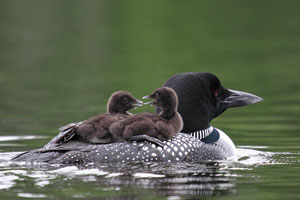February/March 2015 | view this story as a .pdf
Chick magnets: loon parenting is unusually photogenic
Interview by Claire Z. Cramer
 What is it about loons? The splendidly feathered, graceful fish divers have a call that’s so haunting and enchanting it might as well be a soundtrack for Maine. We asked naturalist Doug Hitchcox at Maine Audubon to unravel some of gavia immer’s mysteries.
What is it about loons? The splendidly feathered, graceful fish divers have a call that’s so haunting and enchanting it might as well be a soundtrack for Maine. We asked naturalist Doug Hitchcox at Maine Audubon to unravel some of gavia immer’s mysteries.
Tell us about loon family values.
Chicks ride on adults’ backs for their first week, less in their second week. This is more often on the male’s back than female’s. I imagine chicks have no trouble climbing on an adult’s back at any time, onshore or off. but this is typically just done in the water. On shore, chicks are more likely to rest under the wings of an adult. Most chicks won’t try using their wings until eight weeks. They don’t usually fly until they’re 12 weeks old. Parents stay with the chicks for up to 12 weeks. One usually forages while the other babysits. Adults cannot fly with the chicks on the back. Other species that swim with chicks on their backs include grebes and muted swans.
How about habitat and home life?
In summer, loons move inland to open fresh water, preferably lakes of roughly 60 acres with lots of fish. Lakes with small islands are preferred because they offer a safe place to build a nest. In winter, loons head toward the ocean but generally stay close to shore. Loons typically sleep away from shore, with their heads against their backs and bills tucked in.
What are their hunting habits?
They primarily eat live fish, which they can find in lakes in summer and the ocean in winter. They will supplement crustaceans. I’ve seen loons eating green crabs in Maine. They also catch things like dragonfly larvae and leeches to feed their chicks.
Describe a loon’s worst nightmare.
Adults have very few predators to worry about, though bald eagles have been seen eating adults. Eggs are another story: 40 to 80 percent of nest failures are due to raccoon predation. Other predators include mink, fisher, striped skunks, and sometimes foxes. There is always the risk of opportunistic predators: If adults are scared off eggs by humans, gulls and crows will take advantage and try for a quick meal. Chicks are very vulnerable to predators: eagles, gulls (great black-backed gulls especially), crows, and even aquatic predators like snapping turtles and predatory fish.





0 Comments